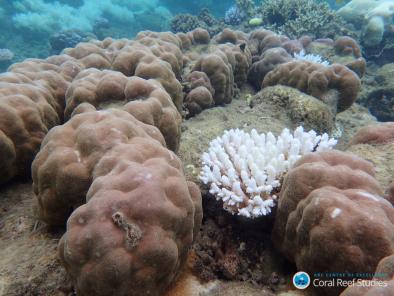Science Source
Global warming and recurrent mass bleaching of corals
We don't have any tools to climate-proof corals. That's a bit sobering. We can't stop bleaching locally. We actually have to do something about climate change.
Terry Hughes, director of the ARC Center of Excellence for Coral Reef Studies in Australia and lead author of the study
- States that during 2015–2016, record temperatures triggered a pan-tropical episode of coral bleaching, the third global-scale event since mass bleaching was first documented in the 1980s
- Examines how and why the severity of recurrent major bleaching events has varied at multiple scales, using aerial and underwater surveys of Australian reefs combined with satellite-derived sea surface temperatures
- Determines the distinctive geographic footprints of recurrent bleaching on the Great Barrier Reef in 1998, 2002 and 2016 by the spatial pattern of sea temperatures in each year
- Finds that water quality and fishing pressure had minimal effect on the unprecedented bleaching in 2016, suggesting that local protection of reefs affords little or no resistance to extreme heat
- Similarly finds that past exposure to bleaching in 1998 and 2002 did not lessen the severity of bleaching in 2016
- Concludes that immediate global action to curb future warming is essential to secure a future for coral reefs
Related Content
Headline

Apr 18, 2018 | Washington Post
Global warming has changed the Great Barrier Reef ‘forever,’ scientists say
Science Source
| World Weather Attribution
Great Barrier Reef Bleaching, March 2016
Science Source
| Proceedings of the National Academy of Sciences
Ocean acidification affects coral growth by reducing skeletal density
Nathaniel R. Mollica, Weifu Guo, Anne L. Cohen et al
Science Source
| PLOS ONE
Coral physiology and microbiome dynamics under combined warming and ocean acidification
Andréa G. Grottoli, Paula Dalcin Martins, Michael J. Wilkins et al


